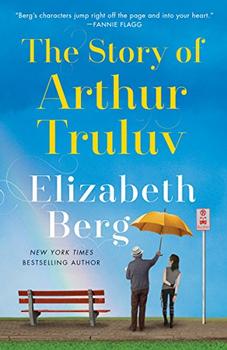Summary | Excerpt | Reading Guide | Reviews | Beyond the Book | Readalikes | Genres & Themes | Author Bio

A Novel
by Elizabeth Berg
He puts the figurine at the center of the kitchen table and stands back to regard it, his hands on his hips. Nola and her figurines. Her little flowered plates and her stationery with birds and apple blossoms. She was a cornball, that one. But who didn't love her?
"Well. Miss Harris," Mr. Lyons, Maddy's English teacher, says when she walks into class. That's all he says, but Maddy knows the rest. He knows she skipped school yesterday; he knows she wasn't ill. He leans back in his chair and crosses his arms and watches as she takes her seat.
Mr. Lyons's first name is Royal. Maddy thinks that's hysterical. She wishes she could ask him what's up with that. Royal. He's got white hair and he's a little fat. Maddy likes people who are a little fat; it seems to her that they are approachable. He's a little fat and he's got awfully pale skin and the links of his wristwatch are twisted like bad teeth. He doesn't care about such things. He cares about words. He taught her one of her favorite words: hiraeth, a Welsh word that means a homesickness for a home you cannot return to, or that maybe never was; it means nostalgia and yearning and grief for lost places. He used the word in a story that he read aloud to the class, and when he looked up, his eyes were full of tears. Nobody made fun of him after class, which was a miracle. Nobody said anything to her, anyway. Not that they would. She's the girl who sits alone in the lunchroom, acting like her sandwich is fascinating. Or did. She skips lunch now.
She doesn't exactly know why kids don't like her. She's good-looking enough. She has a sense of humor. She's not dumb. She guesses it's because they can sense how much she needs them. They are like kids in a circle holding sticks, picking on the weak thing. It is in people, to be entertained by cruelty.
Maddy slides low in her desk so that Mr. Lyons won't call on her today. It's an unspoken agreement they have, another reason she likes him so much. She'd come to school every day if it were just Mr. Lyons. Once she stayed after class to show him a photo she took lying under a tree and looking up. Mr. Lyons told her the photo was really good in a no-bullshit way. "Do you have a title for it?" he asked. Maddy shrugged and said, " 'Framed Sky'?" and Mr. Lyons smiled and said, "Lovely."
Praise is hard for Maddy to hear; it makes her stomach tighten and blood rush to her head, it makes her overly aware of how tall she is. She'd listened to what Mr. Lyons said with no reaction beyond a quick thanks, but later that afternoon, when she was at home and lying on her bed, she looked at the photo again through his eyes. She looked at his comments this way and then that way. What he said could not be seen as anything but good. So . . . so there. She put the photo in the candy box she keeps at the back of her closet. It's a Whitman's Sampler box; her father told her that was her mother's favorite candy, one of the few things he'd shared about her. Maddy never knew her mother; she died in a car crash two weeks after Maddy was born. She'd been on the way to a doctor's appointment. Maddy's father had come home early from work to drive her, but Maddy had a cold and her mother didn't want to take her out. So she told Maddy's father to stay home with Maddy, she'd drive herself. Someone who ran a red light drove into her.
Maddy has a photo of her mother in the candy box. It's one she found stuck in the crevice of a bookshelf. She asked her father if she could have it and he stared at it for a long time, then gave it to Maddy. In the photo, Maddy's mother is leaning against a fence post somewhere out in the country, her arms crossed, smiling. She has a red scarf tied in her hair, and she's wearing jeans and a man's white shirt with the sleeves rolled up, untucked. "Where was she?" Maddy had asked her father, and her father had said, "With me." "What were you doing?" Maddy had asked, and her father'd said, "Picnic." Then he had walked away. Enough, he was saying. Her father will never talk much about her. Too hard.
Excerpted from The Story of Arthur Truluv by Elizabeth Berg. Copyright © 2017 by Elizabeth Berg. Excerpted by permission of Random House. All rights reserved. No part of this excerpt may be reproduced or reprinted without permission in writing from the publisher.
Your guide toexceptional books
BookBrowse seeks out and recommends the best in contemporary fiction and nonfiction—books that not only engage and entertain but also deepen our understanding of ourselves and the world around us.